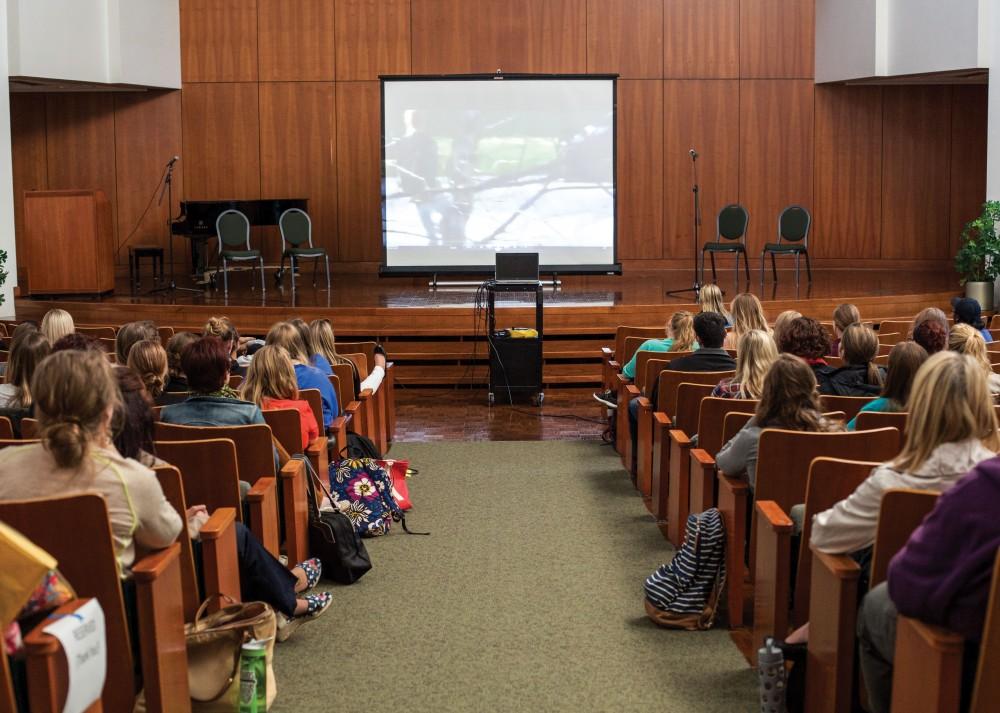Documentary sparks conversation about sexual assault

GVL / Sara Carte Grand Valley students and staff get ready to watch the documentary screening of “The Hunting Ground” in Cook DeWitt on Oct. 6.
Oct 8, 2015
Recently, sexual assault has become a larger part of the national conversation, especially at universities.
Many institutions across the U.S. are currently under investigation for Title IX violations, and Grand Valley State University is among them. The announcement of the federal investigation opened up GVSU students’ eyes and sparked conversation about the reality of sexual assault on campus.
In light of the push to end sexual assault on campus, a documentary called “The Hunting Ground” was released. The film centers around several students discussing their experiences being sexually assaulted on their campuses and being ignored after trying to report the crime or forced to jump through unnecessary hoops by administration.
The film, which was released in February at the Sundance Film Festival, was screened on Tuesday to keep the on-campus conversation flowing about the realities of sexual assault at college and at GVSU.
Ashley Schulte, GVSU’s victim advocate, arranged the screening as a preventative education piece that all students were invited to.
“I’d like for us to have a good conversation about it before (the documentary) hits mainstream media,” she said. “What’s GV doing? I’d rather own the challenge that students are presenting to their institutions and talk about what we’re doing here rather than students seeing it on their own.”
The event, which took place in the Cook-DeWitt Center, drew in about 60 attendees. The audience took part in a panel discussion following the screening, asking questions about policies and procedures and talking to the panelists for their thoughts about the issue.
The panelists included Casey Perisin from the counseling center, Patti Haist from YWCA West Central Michigan, Mary deYoung, a sociology professor and the lead Title IX investigator, Theresa Rowland, Title IX coordinator, with Schulte rounding out the panel.
Once the discussion began, it centered around the resources that GVSU offers on campus. Preventative education is offered through the victim advocate as well as through the Women’s Center and the Milton E. Ford LGBT Resource Center. If a student wants to reach out to resources off campus, they were encouraged to consider the YWCA as their primary option.
“Ideally, I’d love to say that students know about (their resources) but realistically, there’s 25,000 students at Grand Valley,” Schulte said. “Of course we’re always trying to embed what our options are to students in lots of different ways.”
Rowland focused on the differences between disclosure and reporting and what she does as Title IX coordinator, which includes oversight of Title IX activities and education and training for the GVSU community when it comes to supporting victims.
“Your voice is heard,” she said. “There’s a place for you to go.”
When it comes to supporting a victim that opens up about an assault, Haist said being there for them is the most important factor.
“What you can do is believe them and support them in any way you can,” Haist said.
GVSU and the surrounding communities are always open to anyone who wants to reach out and are always working on constantly striving to educate anybody that is interested about it.
“The intersection between activism and education begins in the classroom,” deYoung said.
For more information about GVSU’s resources for victims or advocates, visit the Women’s Center in Room 1201 of the Kirkhof Center.























